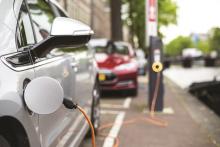New research conducted by the Worldwatch Institute for its Vital Signs Online service indicates that production of passenger vehicles (cars and light trucks) rose from 74.4 million in 2010 to 76.8 million in 2011, and 2012 may bring an all-time high of 80 million or more vehicles. Global sales of passenger vehicles increased from 75.4 million to 78.6 million over the same period, with a projected 81.8 million in 2012. The major driver of increased production and sales are the so-called emerging economies, e
New research conducted by the 6560 Worldwatch Institute for its Vital Signs Online service indicates that production of passenger vehicles (cars and light trucks) rose from 74.4 million in 2010 to 76.8 million in 2011, and 2012 may bring an all-time high of 80 million or more vehicles. Global sales of passenger vehicles increased from 75.4 million to 78.6 million over the same period, with a projected 81.8 million in 2012. The major driver of increased production and sales are the so-called emerging economies, especially China.
The report estimates that 691 million passenger cars were on the world's roads in 2011. When both light and heavy-duty trucks are included, the number rises to 979 million vehicles, 30 million more than just a year earlier. By the end of 2012, the global fleet could top 1 billion vehicles, one for every seven people on the planet.
Although several countries have issued targets for future electric vehicle (EV) fleets, production remains at barely perceptible levels and it remains to be seen whether these goals can be met. China, for instance, wants to put five million plug-in hybrid-electric and fully electric vehicles on its roads by 2020----which could account for more than 40 percent of the global EV fleet that year. An analysis by Deutsche Bank Climate Advisors, however, suggests that production of 1.1 million EVs and a fleet of 3.5 million in China is a more realistic projection.
"Automobiles are major contributors to air pollution and greenhouse gas emissions," said Worldwatch Senior Researcher Michael Renner. "Greater fuel efficiency, along with the use of cleaner fuels, can help mitigate these impacts, although increases in the numbers of cars and the distances driven threaten to overwhelm fuel economy advances."
The report estimates that 691 million passenger cars were on the world's roads in 2011. When both light and heavy-duty trucks are included, the number rises to 979 million vehicles, 30 million more than just a year earlier. By the end of 2012, the global fleet could top 1 billion vehicles, one for every seven people on the planet.
Although several countries have issued targets for future electric vehicle (EV) fleets, production remains at barely perceptible levels and it remains to be seen whether these goals can be met. China, for instance, wants to put five million plug-in hybrid-electric and fully electric vehicles on its roads by 2020----which could account for more than 40 percent of the global EV fleet that year. An analysis by Deutsche Bank Climate Advisors, however, suggests that production of 1.1 million EVs and a fleet of 3.5 million in China is a more realistic projection.
"Automobiles are major contributors to air pollution and greenhouse gas emissions," said Worldwatch Senior Researcher Michael Renner. "Greater fuel efficiency, along with the use of cleaner fuels, can help mitigate these impacts, although increases in the numbers of cars and the distances driven threaten to overwhelm fuel economy advances."






